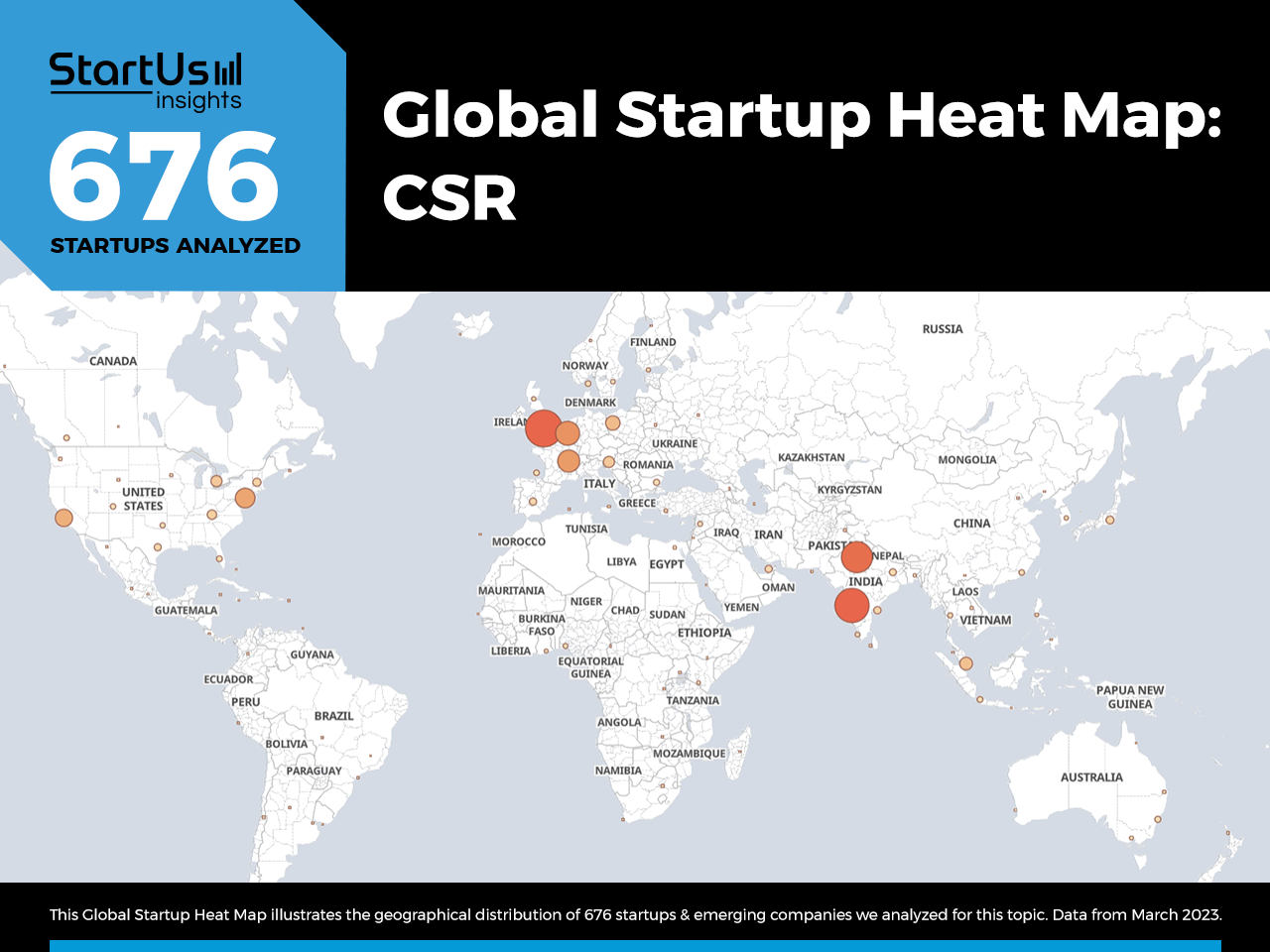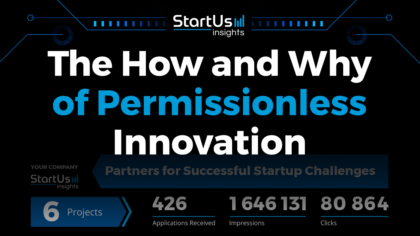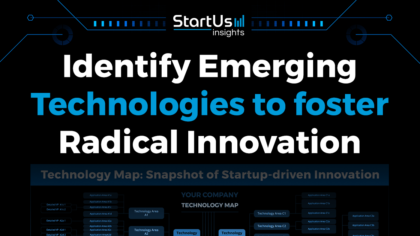Accelerate Productivity in 2025
Reignite Growth Despite the Global Slowdown
Corporations embrace corporate social responsibility (CSR) initiatives to improve employee retention, customer loyalty, and brand image as well as attract investments. Digital inclusion and diversity management are the major trends in corporate responsibility (CR) and social policy. Businesses use different methodologies for corporate accountability reporting and employee engagement. Similarly, technologies such as blockchain and cloud computing accelerate organizations’ efforts on creating a sustainable supply chain and social responsibility. This report delves into the top 10 corporate social responsibility trends and innovations in 2023. Read further to explore how these trends affect your business and industry.
Innovation Map outlines the Top 10 Corporate Social Responsibility Trends & 20 Promising Startups
For this in-depth research on the Top Corporate Social Responsibility Trends & Startups, we analyzed a sample of 676 global startups & scaleups. This data-driven research provides innovation intelligence that helps you improve strategic decision-making by giving you an overview of emerging technologies in the CSR industry. In the Corporate Social Responsibility Innovation Map, you get a comprehensive overview of the innovation trends & startups that impact your company.
These insights are derived by working with our Big Data & Artificial Intelligence-powered StartUs Insights Discovery Platform, which covers 3 790 000+ startups & scaleups globally. As the world’s largest resource for data on emerging companies, the SaaS platform enables you to identify relevant technologies and industry trends quickly & exhaustively.
Tree Map reveals the Impact of the Top 10 Corporate Social Responsibility Trends
Based on the Corporate Social Responsibility Innovation Map, the Tree Map below illustrates the impact of the Top 10 Corporate Social Responsibility Trends in 2023. Corporations provide digital skills training and accessibility to their workforce and marginalized communities through digital inclusion. Companies measure the impact and reach of their CSR activities on environmental, social, and financial fronts through CSR reporting. Similarly, workplace diversity management and employee engagement are top priority areas to create shared value (CSV). Businesses now increasingly rely on blockchain and cloud computing to bring transparency and accountability to their social initiatives. This advances responsible supply chains and cause marketing activities, hence creating value for the business. Moreover, these technological innovations enable companies to make investments that align with their CSR goals and create the desired impact in society. Lastly, startups keep building energy optimization and utilization of renewable energy sources as important CSR goals.
Top 10 Corporate Social Responsibility Trends in 2023
- Digital Inclusion
- CSR Reporting Solutions
- Workplace Diversity Management
- Blockchain
- Cloud Computing
- Employee Engagement
- Impact Investing
- Renewable Energy
- Cause Marketing
- Responsible Supply Chains
Global Startup Heat Map covers 676 Corporate Social Responsibility Startups & Scaleups
The Global Startup Heat Map below highlights the global distribution of the 676 exemplary startups & scaleups that we analyzed for this research. Created through the StartUs Insights Discovery Platform, the Heat Map reveals high startup activity in India and the UK, followed by the rest of Western Europe. Below, you get to meet 20 out of these 676 promising startups & scaleups as well as the solutions they develop. These CSR startups are hand-picked based on criteria such as founding year, location, funding raised, & more. Depending on your specific needs, your top picks might look entirely different.
Top 10 Corporate Social Responsibility Trends in 2023
1. Digital Inclusion
Digital inclusion is an important aspect to connect underserved segments of society with critical and essential digital technologies and the internet. For this purpose, startups develop digital skills training and education programs that help people acquire digital skills and increase employability. Human resources (HRs) also leverage these programs internally for employee digital literacy and skill development. Similarly, companies provide free or subsidized access to tools, such as computers, smartphones, and internet connectivity, to bridge the digital divide. Community Wi-Fi initiatives in underserved areas and incorporating accessibility features into product offerings for the physically challenged are examples of digital inclusion. Additionally, companies partner with non-profit organizations or provide funding, technology, and other resources to support inclusion programs and initiatives.
Trestle Labs builds Inclusive Education Software
Indian startup Trestle Labs develops assistive technology solutions that empower blind and visually impaired individuals to access any type of content. Its products, Kibo mobile app, Kibo XS device, and Kibo Desk web software, enable users to translate, digitize, and audio’tize content on the go. The startup utilizes image-based scans of printed and handwritten documents to offer audio-based access to these documents. Trestle Labs’s software equips schools, universities, libraries, and workplaces to create inclusive environments for their visually impaired students and employees.
Sign-Speak facilitates Disability Inclusion
US-based startup Sign-Speak offers a sign language recognition software and application to recognize and translate American sign language. It uses machine learning and computer vision to enable real-time communication between deaf and hearing people. The app translates sign language into spoken and written language, and vice versa, enabling seamless communication without the need for an interpreter. SignSpeak removes communication barriers for deaf and hard-of-hearing clients and employees while creating an accessible work environment.
2. CSR Reporting Solutions
CSR reporting quantifies a company’s social and environmental performance to its stakeholders. Stakeholders, policymakers, and governments utilize these metrics to introduce policy changes and set guidelines. Innovations in CSR reporting enhance transparency, accountability, and stakeholder engagement. Companies use an integrated reporting approach, which combines financial and non-financial information, to provide a comprehensive view of their overall performance. Similarly, corporations conduct materiality assessments to identify the issues and allocate resources to prioritize their CSR efforts on the most relevant issues. Companies further use digital platforms and third-party assurance to report their CSR performance. This increases the credibility of CSR disclosures and improves stakeholder confidence. Moreover, corporations demonstrate their commitment to sustainable development by providing impact measurement and reporting of their CSR programs. Many companies rely on standards such as the global reporting initiative (GRI) for CSR reporting to assess the created shared value.
Moovegreen aids Sustainability Assessment
Moovegreen is an Italian startup that builds an assessment platform to rate a business on corporate sustainability. The platform measures and certifies business data on environmental, social, and governance (ESG) scope and provides GRI standard visualizations. It also uses historical data and industry benchmarks to communicate the business’s sustainability rating to its stakeholders. This enables business stakeholders to evaluate their CSR performance on select key performance indicators (KPIs) and UN sustainable development goals (UN SDGs).
Lowsoot provides Carbon Neutrality as a Service
Lowsoot, an Indian startup, develops a web platform to enable a business to achieve their net-zero targets. Its carbon neutrality as a service tool performs a life cycle assessment (LCA) of an organization’s product and service offerings. The tool measures the emissions and carbon footprint in the process and provides guidelines to reduce the same and strategically achieve net-zero operations. It also offers carbon offset service through verified greentech solutions. Companies use Lowsoot’s platform to set and attain science-based emissions reduction goals that simultaneously align with their business strategy.
3. Workplace Diversity Management
Workplace diversity management creates an inclusive and equitable work environment that increases business productivity by attracting and retaining suitable talent. Businesses leverage digital platforms to offer diversity training programs and increase awareness among their workforce. Other such platforms provide skill-building tools for training employees to work in diverse teams and reduce bias and discrimination. Startups further utilize diversity recruitment practices, like blind recruitment, diversity metrics, and quota implementation, to attract diverse talent pools. Similarly, businesses create employee resource groups (ERGs) to equip employees from diverse backgrounds and connect, share experiences, and provide feedback. This enables companies to address diversity barriers and mitigate biases in the workplace. Startups build diversity, equity, and inclusion (DEI) platforms to track the representation of different groups in the workforce and provide accountability.
Learnlab.ai delivers Diversity Training
Canadian startup Learnlab.ai provides an online learning platform to train organizations in assessing, onboarding, engaging, and growing their talent lifecycle. It offers various courses on topics, such as unconscious bias, microaggressions, and allyship, and includes interactive challenges to solidify understanding. These challenge frameworks integrate into the organization’s hiring, training, and employee engagement process to meet its diversity goals. The startup caters to enterprises that want to become equal-opportunity employers.
Mixity provides Diversity Footprint Analysis
French startup Mixity develops Mixity Start, a diversity footprint analysis tool. It assesses an organization’s current diversity and inclusion levels to generate insights into improvement areas. For this, the tool utilizes self-assessment surveys and reviews organizational policies, practices, and culture. It then creates customized action plans to enable the organization to achieve its diversity and inclusion goals.
4. Blockchain
Blockchain increases transparency, accountability, and efficiency in social and environmental impact reporting. Startups create transparent and traceable supply chains using blockchain to track the movement of raw materials and products. This also helps in identifying social and environmental risks in the supply chains, such as forced labor and environmental degradation. Businesses develop digital tokens that represent carbon credits, greenhouse gas (GHG) emission offsetting, incentivization, and emissions trading. Similarly, sustainable financers tokenize their investments and donations to trace investment impacts. This ensures the flow of capital to sustainable projects and reduces fraud. Additionally, blockchain enables corporations to redirect funding to projects in rural areas that generate their own renewable energy. Lastly, startups leverage the immutability of blockchain for secure and verifiable impact reporting, thereby increasing the accountability of CSR efforts.
Retraced simplifies Compliance Management
German startup Retraced makes a blockchain-powered compliance and sustainability management solution for the fashion industry. The startup’s vendor management CSR platform offers tools for risk analysis, supply chain mapping, supplier assessment, communication, and more. It enables brands and businesses to track the sustainability performance of their suppliers and ensure compliance as per their CSR goals. Further, brands and companies use it to communicate their sustainability efforts to consumers, improving brand image.
Reason Solution improves Investment Transparency
Italian startup Reason Solution facilitates investment transparency through its social investing platform. It leverages blockchain to monitor the flow of social investments and track the impact generated from it. Blockchain ensures that the funds are utilized for the designated purpose and at the approved time. This provides control over philanthropic fund utilization, generates reliable data, and reports outcomes to all the business partners and local communities.
5. Cloud Computing
The implementation of cloud-based CSR programs enables scalable, cost-effective, and flexible solutions for data management, communication, and collaboration. Cloud computing tools ensure continuity of the CSR activities by simplifying collaboration through video conferencing and anywhere document sharing. They reduce costs and carbon emissions associated with business travel, adding to energy savings. Further, cloud-based software architecture provides a scalable and secure solution for managing large amounts of data efficiently. This aids companies in managing their environmental impact data and complying with reporting requirements. Moreover, cloud computing minimizes the impact of natural disasters on business operations by offering secure data recovery. Organizations use cloud architecture to build artificial intelligence (AI) tools and further centralize impact measurement and reporting.
Soop aids Operations Management
New Zealand-based startup Soop develops a cloud-based software as a service (SaaS) platform for food hygiene management. The platform monitors all food and beverage operations in real-time and assesses hygiene compliance. It features a dashboard that provides a single view of all processes digitally. This enables food businesses to eliminate food-borne illnesses, thus reducing food wastage.
Updapt offers Centralized ESG Data Management
Indian startup Updapt provides an ESG data management platform. It streamlines data collection from various sources of business operations and centralizes GHG accounting information. The platform analyzes these data against various ESG parameters and the latest GHG reporting guidelines. It enables businesses to monitor scope 1 to 3 GHG emissions from operations for location-specific emission factors and calorific values of fuels. This reporting improves transparency, stakeholder engagement, and corporate reputation.

6. Employee Engagement
Employee engagement and involvement enable companies to build a strong culture of sustainability, facilitate innovation, and attract and retain top talent. Startups develop gamified platforms to make CSR initiatives more immersive for employees. Employees also get to reduce their carbon footprint through such platforms through corporate volunteering, charity donations, CSR challenges, etc. Companies utilize social media to engage employees in CSR initiatives, share stories of impact, and foster a sense of community. Besides, employee volunteering is an increasing trend for building a strong culture of sustainability. Businesses incentivize corporate volunteering by offering paid time off for volunteering, recognition, organizing volunteer events, or matching employee donations to charity.
Purpozed enhances Corporate Volunteering
German startup Purpozed provides a corporate volunteering platform. It matches individual skills and interests with social and professional volunteering commitments. The platform also offers flexible skill-based and micro-volunteering for people who want shorter commitments. Further, this plug-and-play platform uses this data to add to the organization’s sustainability and social commitment reports. Businesses and nonprofits use it to improve employee engagement and reach their CSR KPIs.
Reciprocit facilitates Donation Matching
US-based startup Reciprocit offers a donation matching and workplace giving platform. It connects employees directly to charities and offers donation matching that automatically deducts the donations from the payroll. This eliminates the administrative costs of benefits programs like giving, gift matching, and volunteering for small and medium-sized companies.
7. Impact Investing
Companies invest in socially and environmentally responsible initiatives that generate both financial returns and positive social or environmental impact. Corporations do this through impact investing instruments such as social impact and green bonds. Social impact bonds enable private investors to fund social programs backed by government incentives. Similarly, green bonds allow companies to finance their own sustainability initiatives or raise capital for sustainability projects. Community development financial institutions (CDFIs) also provide microfinancing and lending to underserved communities and small businesses. Companies invest in CDFIs as part of their CSR goals to support community development while generating financial returns. Other such instruments include impact funds that support a range of sustainability initiatives from clean technology to sustainable agriculture and infrastructure investment.
NGOrganize advances Investment Risk Management
US-based startup NGOrganize develops Corecentra, a cloud-based SaaS platform for ESG investment risk assessment and management. It offers on-demand impact transparency through AI-powered ESG-specific analytics and pre-built ESG data models based on industry-standard frameworks. Institutional investors evaluate the ESG performance of their private equity investment portfolios using Corecentra. This enables private equity firms to continuously gather actionable insights from all stages of a deal lifecycle and measure the impact generated.
Etcho accelerates Impact Assessment
UK-based startup Etcho builds an eponymous tool to assess the impact goals of investments. It allows financial service firms to visualize the impact suitability of their investment portfolios and generate off-the-shelf or tailored analytical reports. Further, the tool features a research portal to offer live impact data of selected investments at fund, portfolio, and equity levels. Additionally, the startup provides a mobile app to guide individual investors in conscious investment decisions and analyze current stock investment performance.
8. Renewable Energy
Solutions for energy saving and consumption monitoring enable companies to reduce their carbon footprint and energy bills as well as incorporate sustainability into their operations. These clean energy parameters now form a major part of CSR goals and performance measures. Therefore, companies adopt solutions, such as renewable energy microgrids and distributed energy resources (DERs), for on-site power generation and electricity storage. Energy optimization of existing buildings and systems is another key CSR focus area materialized by using smart grids. Startups build digital energy management systems (EMS) for real-time analytics to optimize energy consumption in buildings, factories, and other facilities. Other such methods include energy-efficient lighting like LEDs, energy storage systems (ESS), and building automation systems for heating, ventilation, and air-conditioning (HVAC). Similarly, companies utilize methods like carbon capture and utilization (CCU) or renewable energy certificates (RECs) trading to offset their carbon emissions.
Insens simplifies Energy Monitoring
Belgian startup Insens provides a condition monitoring and predictive maintenance system, Rotating Equipment Diagnosis (RED). It comprises smart diagnostic sensors that continuously monitor the electrical signature of alternating current (AC) motors of rotating production equipment. The system alerts the maintenance teams upon detecting any developing electrical or mechanical failures and suggests preventive actions. It also performs real-time energy monitoring and generates insights to save energy. This prevents unplanned industrial equipment downtime and reduces energy consumption, increasing equipment reliability.
PwrHouse provides a Virtual Power Plant (VPP)
UAE-based startup PwrHouse provides renewable energy generation, storage, and utilization solutions. Powerhouse Energy Cloud is the startup’s virtual power plant that aggregates distributed networks of renewable energy assets and energy storage technology. It balances the production and management of energy across all sites to optimize energy consumption and storage. This improves power balancing and green energy distribution based on demand and supply. Power and telecom operators use the startup’s VPP for grid stabilization and making green energy affordable.
9. Cause Marketing
Companies apply cause marketing to capture audiences whose interests align with their cause or to promote their product offerings in a positive light. They leverage social media marketing for purpose marketing of products or services while also raising awareness or support for a cause. This improves customer engagement, and content sharing, and generates donations or other forms of support. Further, corporations advance their CSR activities by co-branding a product or service in partnership with non-profit organizations or social causes. This is further advanced through point-of-sale (POS) and in-kind donations, where companies pledge their products or services to the cause. Startups offer tools to manage cause branding to target and engage with millennials and gen-Z. Besides, companies feature gamification and virtual reality (VR) elements in their campaigns to increase viewer participation.
IncOperate offers Digitized Purpose Publicity
US-based startup IncOperate makes a real-time campaign management platform Henoscene powered by blockchain. It allows cause-marking organizations and companies to create customizable campaigns linked to impact projects of choice. Users create an immutable registry of execution commitments, transactions, and activity instances. Henoscene provides real-time insights on user-defined KPIs and objective key results (OKRs) of these campaigns and measures campaign performance. The blockchain aspect provides transparency of donation fund utilization to consumers across humanitarian, ecological, and ethical responsibility areas. This enables brands to publicize their social purpose initiative and gain customers.
T GOOD FIGHT facilitates Impact Advertising
Indian startup T GOOD FIGHT develops ViewsForChange, an impact marketing technology platform that scales donations with ad performance. It enables the integration of impact donations in any advertising campaign or preset consumer call-to-action (CTA) and executes the desired action. Moreover, it allows embedding widgets for both organic and paid users, showcases impact reporting, and offers floating story widgets for paid visitors. Brands utilize this platform to target customers based on the initiatives of their interest and enhance purchasing intent and brand value.
10. Responsible Supply Chains
Responsible sourcing and supply chain management are integral to a company’s CSR goals as major carbon emissions occur in goods movement. CSR startups increasingly use technologies such as blockchain, the internet of things (IoT), and tags to improve transparency and accountability in supply chain management. Additionally, innovations in automating supplier evaluation on ESG, UN SDGs, and tailored CSR criteria are increasing. Sustainable sourcing of raw materials and finished goods are important practices for a corporate’s environmental and social responsibility. Companies are also making their supply chain circular by reusing and recycling materials and minimizing waste. Regulatory organizations, such as fair trade certification, authenticate the sustainability and social responsibility of corporate supply chains through regular auditing.
OSCAR offers Automated Sustainable Procurement
UAE-based startup OSCAR provides a sustainable procurement automation platform. Its Oscar KYP service automates due diligence as per customers’ sustainability goals for their procurement activities. It assesses supplier risk exposure and ensures that these offerings align with the sustainability goals. Corporations and large-scale project operators use OSCAR’s platform to ensure the sustainability of their projects and save time on procurement automation.
Nyala Blue aids Supply Chain Auditing
Belgian startup Nyala Blue develops a blockchain-based SaaS platform for supply chain auditing. The platform stores data at each point in the supply chain such as producers, exporters, transport companies, and importers on the blockchain. This creates a unified audit trail linked to individual batches as well as shipments and simplifies tracking, measuring, and reporting. It enables different supply chain stakeholders to verify and communicate sustainability data of the supply chain for reporting and compliance management.
Discover all Corporate Social Responsibility Trends, Technologies & Startups
Startups are utilizing innovative technologies such as AI and immersive technologies to execute CSR initiatives. They accelerate the execution and reach of these CSR programs and improve success rates. Similarly, corporations utilize advancements in 3D printing for responsible manufacturing and construction. These technological advancements introduce greater transparency and accountability and ultimately translate into improved outcomes for society and climate. The Corporate Social Responsibility Trends & Startups outlined in this report only scratch the surface of trends that we identified during our data-driven innovation & startup scouting process. Identifying new opportunities & emerging technologies to implement into your business goes a long way in gaining a competitive advantage.










